In mid-August, the Maryland Defenders Union sent a survey to the frontline workers of the Office of the Public Defender that asked a variety of questions about OPD and how it could be improved. We received a total of 187 responses from all over the agency, covering every district except one (District 12) and a number of the non-geographic divisions. Of those 187 responses, 119 came from attorneys, 60 came from core staffers, and eight from social workers. Respondents expressed their concerns with a wide range of issues but also showed significant agreement on several key principles.
The survey was not exclusively focused on any one issue, but we asked several questions specifically about the COVID-19 pandemic and OPD’s response. Out of a list of several possible COVID-related concerns, large proportions of respondents identified four items as particularly worrying. The number one COVID-related concern, shared by 84 percent of respondents, was the health and safety of our clients, both those in dangerous detention centers and those being forced to attend crowded court hearings. OPD workers are united in our concern for our clients in this dangerous time. Our own safety was also a priority, as 81 percent of respondents were concerned about their own health at work or in court hearings and 78 percent were concerned about the possibility of exposure to individuals with COVID-19. Finally, 65 percent of respondents were concerned about the lack of clear procedures around mask requirements, social distancing, and contact tracing. This data did vary somewhat by district. For example, 62 percent of respondents from Baltimore County (where multiple persons in the office have tested positive for COVID-19) are very concerned about office safety protocols, and 87 percent of respondents from Prince George’s County (where former and current inmates are suing the detention center over unsafe conditions) are concerned about client health. Most districts had small numbers of individual respondents, however, so drawing firm conclusions from the variations is not possible.
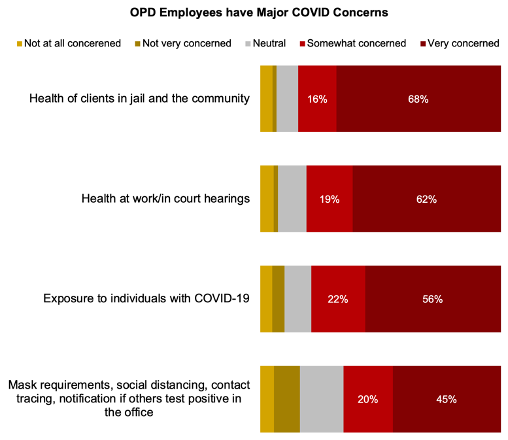
There were some similarities and some substantial differences between responses from core staffers and responses from attorneys, as shown in the below charts. Roughly equal proportions (60% of attorneys and 64% of core staffers) were very concerned about exposure to individuals with COVID. Similarly, 74 percent of attorneys and 60 percent of core staffers were very concerned about the health of clients, both incarcerated and not. On the other hand, 62 percent of core staffers were very concerned about family members with health issues, compared to 27 percent of attorneys, and 60 percent of core staffers were concerned about adequate office safety protocols, compared to 38 percent of attorneys. This likely reflects the fact that many core staffers are required to work from the office more consistently than attorneys, increasing their risk of exposure (and the corresponding risk of exposing their family members).
With only eight social worker respondents, it would not be statisitcally valid to separately break out their responses. Holistic responses from social workers showed that they shared many of the same concerns as core staffers and attorneys, including client safety and well-being, personal safety, and insufficient communication from OPD management. But social workers had some unique concerns as well, such as the difficulty of assessing clients without being able to safetly meet them in person and the emotional burden of providing support to clients, families, and colleagues in relation to the trauma of the pandemic.
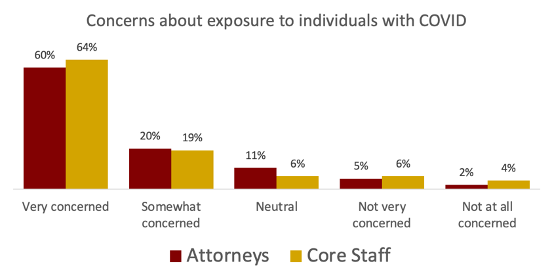
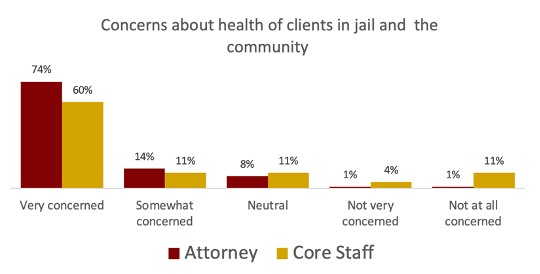
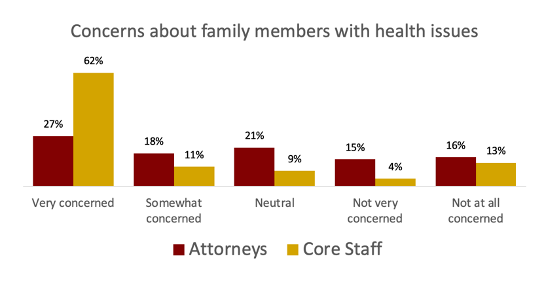
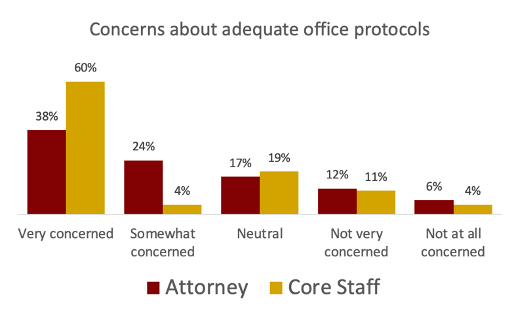
We also asked respondents what demands related to the COVID-19 pandemic they wanted the Maryland Defenders Union to make of management. The six demands pictured to the right – seek redress from a higher authority for unsafe court openings; do not require employees to enter unsafe courthouses; ask the judiciary to suspend in-person appearances for non-incarcerated clients; enforce rules around mandatory face mask use; supply personal protective equpiment to all employees; and enforce social distancing in OPD offices – garnered the highest levels of support from respondents.
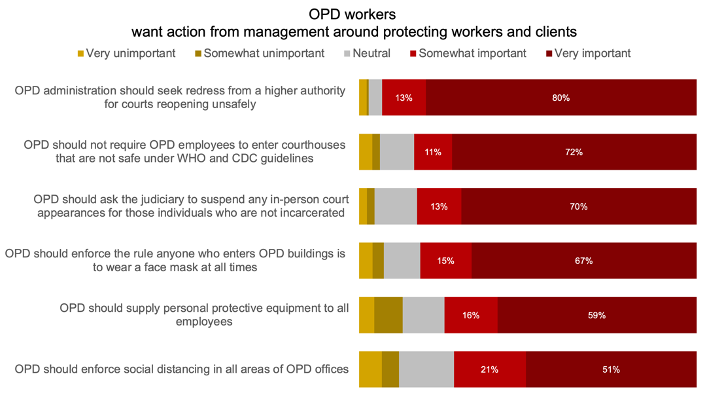
Additionally, respondents expressed in their own words what demands they had for OPD Administration, and several came up repeatedly. Workers want more transparency from management about negotiations with the courts around reopening, particularly with the October 5 deadline for the resumption of jury trials approaching fast. They want clearer communication from management around protocols for social distancing, isolating, and testing after possible exposure to COVID. (Far too many respondents have learned about other OPD workers or courthouse staff testing positive through informal channels rather than official communications.) And respondents want core staff to be able to telework as much as possible. Many, many core staff could do all their work from home but are instead required to work from the office, in shared and open office spaces where social distancing is difficult or impossible, putting themselves and their families at increased risk.
But respondents were not concerned solely about COVID-19. The deficiencies in the agency’s pandemic response are the product of longstanding issues that manifest in a variety of areas, not just health and safety. Respondents expressed the highest levels of dissatisfaction with staffing levels: two-thirds agree that there are simply not enough OPD employees to do the necessary work. Salaries, transparency and communication, opportunities for advancement, caseloads, and racial equity saw similarly high levels of dissatisfaction. Respondents were also frustrated with more prosaic working conditions like IT support, training, and office supplies. On the other hand, over two-thirds of respondents were moderately or very satisfied with their relationship with their direct supervisor, indicating their belief that OPD’s issues are the product of something more fundamental. Respondents from each of the three job types had very similar responses in this section, but some distinctions are worth noting. Dissatisfaction with salary levels was much higher among core staffers (61 percent) than attorneys (20 percent), while attorneys were more likely to think caseloads were a problem.
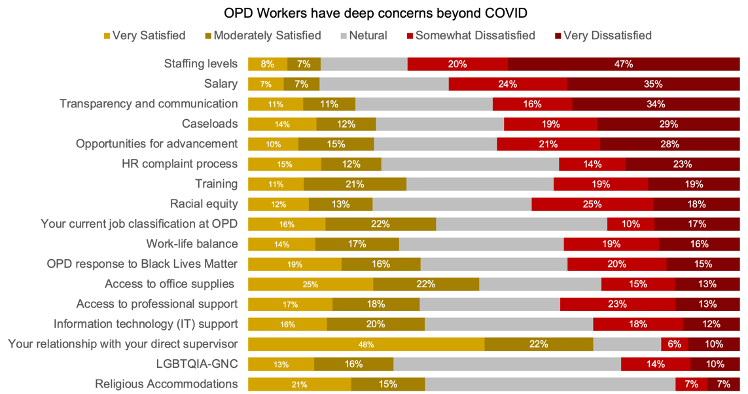
We also asked a basic but critical question: do you feel respected at work? Every OPD worker deserves the respect of their peers and supervisors, especially given the tremendous odds we fight against daily, often without adequate compensation or safety measures. However, over half of survey respondents reported not feeling respected at least some of the time, a figure that is far too high for a healthy workplace.
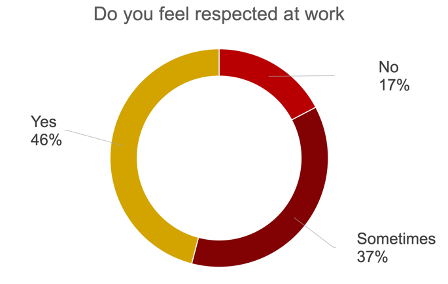
Lastly, we asked respondents to tell us in their own words what one thing could make OPD better. We received a wide range of responses, but most could be divided into six basic categories: make our workplaces safe; improve communication and transparency; hire more staff; pay workers better and more equitably; make caseloads less overwhelming; and create more opportunities for advancement.
Thank you to everyone who completed the survey and helped us understand what issues matter most to OPD workers! We know that priorities change over time, so this will certainly not be the last time we ask for input. In the meantime, make your voice heard by joining the union or contacting us at [email protected].